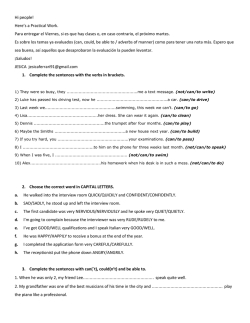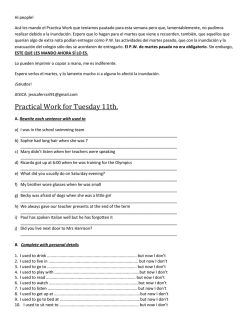
CÓMO MONTAR UN ESTUDIO DE DISEÑO Y NO MORIR EN EL
Ie school of Communication 50 CÓMO MONTAR UN ESTUDIO DE DISEÑO Y NO MORIR EN EL INTENTO HOW TO SET UP A DESIGN STUDIO AND NOT DIE IN THE PROCESS por: / by: Borja Delgado Diseñador, Fundador de Hanzo. Profesor en el Master in Visual Media Designer / Founder of Hanzo. Professor, Master in Visual Media A veces avanzar en situaciones difíciles requiere de bastante determinación y algo de suerte. Creo que podemos encontrar un poco de ambas cosas en la creación de Hanzo, un estudio de diseño lanzado en plena crisis. En este artículo se recogen algunas opiniones, fruto de la experiencia en primera persona, que espero puedan servir de ayuda o inspiración. Nuestras motivaciones Cuando empezamos a pensar en montar el estudio llevábamos ya mucho tiempo en el sector, y nos dimos cuenta de que teníamos ideas propias a la hora de definir cómo nos gustaría trabajar. Buscábamos principalmente estar orgullosos de nuestro trabajo, poder organizarnos de una forma más libre y algo más de rentabilidad. Y queríamos hacerlo sobre una base de honestidad. Honestidad hacia nuestro trabajo, hacia nuestros clientes y hacia nuestro equipo. Queríamos alejarnos del “todo vale” de los proyectos con prisas, del “sí señor” de las agencias y del “podemos hacerlo todo” de las grandes consultoras. Creamos un producto, no una empresa Para nosotros fue de gran ayuda pensar en la empresa como un producto, con unas características claras y definidas. Si ese producto tenía sitio en el mercado estaríamos encantados; pero si no lo tenía, simplemente lo retiraríamos. Es decir, la empresa en sí misma no tenía valor, lo que era importante era cómo hacía las cosas. De esta manera poníamos el foco en lo realmente importante: trabajar a nuestra manera, teniendo siempre claras las razones por las que pusimos todo en marcha. Primeros pasos Poner en marcha un proyecto así no fue sencillo. Para optar a proyectos relevantes necesitábamos un equipo muy senior, que no dejara duda alguna de su solvencia delante de grandes clientes. Pero era prácticamente imposible fichar directamente ese tipo de perfiles, todos ya con buenos trabajos y remuneraciones. Así que tratamos de resolver el problema de la siguiente manera: • Definimos las grandes áreas de responsabilidad en la empresa, buscamos a una persona idónea para ellas y le ofrecimos ser socio. Poca gente bien posicionada se subiría al barco por un sueldo incierto, pero la idea de crear algo propio les resultaba mucho más atractiva. • No obstante, los porcentajes en la participación no fueron simétricos sino que se definieron en función de la aportación de valor de cada uno, entendida como talento, criterio, relevancia y proyección comercial. • Todos trabajábamos internamente como freelances, pudiendo compaginarlo con proyectos fuera del estudio. Sometimes making progress in difficult situations requires considerable determination and a little luck as well. I think we can find a little bit of both in the creation of Hanzo, a design studio launched in the middle of a crisis. This article includes several views, the result of first-hand experience, which I hope can be of help or inspiration. Our motivations When we started thinking about setting up the studio we had already been in the business a long time and we realized we had our own ideas when it came to defining how we wanted to work. Mainly we wanted to be proud of our work, to be able to organize ourselves more freely and to make a little more profit. And we wanted to do so with a basis of honesty: honesty towards our work, towards our customers and towards our team. We wanted to move away from the “anything goes” of rushed projects, the “yes, sir” of the agencies, and the “we can do everything” of the big consultants. We created a product, not a company For us it was a big help to think of the company as a product, with some clear and distinct characteristics. If that product had a place in the market we would be delighted; but if not, we would simply withdraw it. In other words, the company itself had no value; what was important was how it did things. In this way we put the focus on what really matters: working our way, always being clear about the reasons why we started this endeavour. First steps Launching such a project was not easy. To compete for important projects we needed a very 51 IE School of Communication • Cada uno cobraba según las horas trabajadas, evitando las sensaciones de injusticia y agravios comparativos. Así formamos un equipo con amplia experiencia e implicado a futuro, pero con la libertad y la flexibilidad necesarias para sobrellevar el lanzamiento hasta que Hanzo consiguiera masa crítica de proyectos. Una organización flexible El sistema de organización en Hanzo es muy flexible. El equipo tiene libertad para organizarse (horario, situación, etc.) siempre que se garantice la calidad del trabajo, las fechas de entrega y una comunicación fluida con el resto del equipo y con el cliente. Este sistema requiere personas muy responsables y una empresa que les otorgue la confianza necesaria para serlo. “La gente tiende a comportarse como tú esperas que lo hagan”. La idea central del conocido efecto Pigmalión – ampliamente estudiado en educación – es que las expectativas que se tienen de una persona influyen en su comportamiento. Según nuestra experiencia, cuando se siente desconfianza hacia las personas, cuando se les trata de irresponsables a los que hay que controlar, ellos tienden a comportarse exactamente de esa manera. En cambio, si se les da confianza, ésta es devuelta de manera multiplicada. Hay quien dice que tenemos un modelo de “no gestión”. No estoy de acuerdo. Tenemos un modelo de gestión autónoma, basado en la responsabilidad personal, que nos permite reducir el tiempo dedicado al control del equipo y maximiza su eficiencia y autonomía. De pérdidas e inversiones El ser capaz de llevar a la realidad los principios de calidad, libertad y justicia en las relaciones con el equipo conlleva un cierto sobredimensionamiento en personal respecto a lo que es habitual en el sector. Podría pensarse que es un dinero que Hanzo pierde, pero nosotros preferimos verlo como un dinero que Hanzo invierte. Y lo invierte en mantener un equipo en buenas condiciones mentales, sin una carga de trabajo al límite. Lo que favorece que pueda centrarse más y mejor en los proyectos, y redunda en la calidad final del producto, que es la más importante de nuestras señas de identidad. Los peligros Si tuviera que señalar el mayor peligro que ha amenazado nuestras ideas, éste ha sido la avaricia. Hay que tener mucho cuidado en no aceptar más proyectos de los que se pueden llevar bien, lo que significa tener que decir que no a proyectos muy interesantes. Hay que intentar saber qué proyectos pueden ser lucrativos, pero no encajan con tu empresa. Y hay que resistir las tentaciones al revisar los costes salariales y pensar que la gente podría trabajar mucho más por mucho menos… A modo de epílogo Wesley, el protagonista de La princesa prometida, cae prisionero del temido Pirata Roberts, quien le perdona la vida pero solo por un día. Wesley trabaja muy duro y por la noche Roberts le dice “Buenas noches, buen trabajo, duerme bien. Lo más probable es que te mate mañana”. Y esa misma frase se la repite todas las noches durante muchos años, hasta que finalmente le hace capitán. Bajar la guardia significa perder tensión y foco. senior team, one that would leave no doubt as to its competency when dealing with major clients. But it was practically impossible to directly sign up that kind of individual because they all already had good jobs and salaries. So we tried to solve the problem as follows: • We defined the major areas of responsibility in the company; we looked for a suitable person for each and offered him/her a partnership. Few well-positioned people would come on board for uncertain wages, but they found the idea of creating something of their own much more attractive. • However, participation percentages were not symmetrical but rather were defined based on each individual’s contribution, understood as talent, judgment, relevance and commercial potential. • We all worked as freelancers internally, with the option of combining that work with projects outside the studio. • Each of us charged based on hours worked, thus avoiding sensations of injustice and comparative grievances. This way we formed a team with extensive experience and a commitment to the future, but with the freedom and flexibility to cope with the launch until Hanzo became successful. A flexibe organization The organization system at Hanzo is very flexible. The team has the freedom to organize themselves (time, location, etc.) provided that work quality, deadlines and good communication with the rest of the team and the client are guaranteed. This system requires very responsible people and a company that gives them the confidence needed to be responsible. “People tend to behave as you expect them to.” The thrust of the Pygmalion effect -extensively studied in education- is that the expectations we have of a person influence his or her behaviour. It has been our experience that, when you feel distrust towards people, when you treat those you need to control as being irresponsible, that is exactly how they tend to behave. On the other hand, if you trust them, that trust returned is multiplied. Some say we have a model of “no management”. I disagree. We have a model of self-management, based on personal responsibility, which allows us to reduce the time spent on control of the team, and maximizes their efficiency and autonomy. About losses amd investments Being able to bring to reality the principles of quality, freedom and justice in relationships with the team implies a certain oversizing of personnel with respect to what is common in the industry. One might think that it is money that Hanzo is losing, but we prefer to see it as money that Hanzo is investing. And we are investing it in maintaining a team with a good mental attitude, without a workload to the limit. This leads to more and better focus on projects, and influences the final quality of the product, which is the most important part of our identity. The dangers If I had to pinpoint the greatest danger that has threatened our ideas, it is greed. You have to be very careful not to take on more projects than you can handle, which means having to say no to some very interesting projects. You must try to determine which projects may be lucrative, but do not fit with your company. And you must resist the temptation to revise wage costs and to think that people could work much more for much less... As an epilogue Wesley, the protagonist of The Princess Bride, is taken prisoner of the Dread Pirate Roberts, who spares his life but only for a day. Wesley works very hard and in the evening Roberts says “Good night, good job, sleep well. I most likely will kill you tomorrow.” And Roberts repeats that same sentence to Wesley every night for many years, until finally he makes him a captain. Dropping your guard means losing attention and focus.
© Copyright 2026


